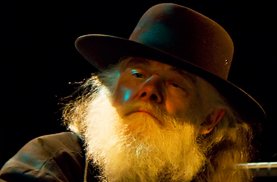At the age of 87, multi-instrumentalist genius and last surviving member of The Band Garth Hudson departed away leaving a rich musical legacy that will be felt for next generations. Hudson’s skill and inventiveness influenced the sound of a time as the creative force behind classic songs including “Up on Cripple Creek, “The Weight,,” and “Rag Mama Rag.” We honor his extraordinary life, contributions to music, and ongoing influence in this extensive post-mortem.
Garth Hudson was whose?
An outline of Garth Hudson’s early life
Born in Windsor, Ontario, in 1937, Garth Hudson was the son of musicians who early on deeply loved music. Formal piano and other instrument instruction set the groundwork for a career redefining musical limitations.
Uniting The Band: A Musical Turning Point
recruited by Ronnie Hawkins, Hudson joined The Band—then known as The Hawks—in the early 1960s. Though first hesitant about joining a rock group, he welcomed the chance and grew to be an integral member of the group.
The Band: Composing a New Musical Identity
from The Hawks to The Band
Originally Bob Dylan’s backing band, The Band developed into a stand-alone entity with their innovative first album, Music from Big Pink. The band’s distinctive sound was influenced by Hudson’s creative use of the Lowrey organ and his ability to combine modern rock with classical expertise.
The Basement Tapes: A Revolutionary Team Work
Hudson led recording sessions producing over 100 songs in 1967, during Bob Dylan’s semi-seclusion in Woodstock, New York, eventually known as The Basement Tapes. For Americana and roots music, these sessions grew to be pillar events.
Garth Hudson’s Musical Mastery: The Instruments
The Lowrey Organ: An Original Sound Signature
Hudson was unequaled in his Lowrey organ expertise. From the drunken clavinet on “Up on Cripple Creek” to the soaring melodies of “Chest Fever,” he changed the function of the instrument in rock music.
Arsenal from a Multi-Instrumentalist
Hudson’s skill set went beyond keyboards. Playing horns, synthesizers, saxophones, and more, he gave The Band’s songs diverse textures. His adaptability won him the moniker “self-educated Greek chorus.”
Legendary Tracks Reflecting Garth Hudson’s Genius
” Chest Fever” and “The Genetic Method”
Hudson’s organ solo on “The Genetic Method,” the precursor to “Chest Fever,” is a master class in melody and mood. Its multifarious character highlighted his improvising ability.
“It makes no difference.”
The sad saxophone in “It Makes No Difference” underlined Hudson’s capacity to capture strong feeling in his compositions.
The Golden Years and Trials of the Band
Musical Cultural Effect of The Band
Songs like Stage Fright (1970) and The Band (1969) confirmed the group’s position in musical history. Hudson’s arrangements affected contemporaries including The Beatles and Eric Clapton.
Conflict Inside The Band
Notwithstanding their achievements, conflicts emerged, especially between drummer Levon Helm and guitarist Robbie Robertson. These tensions helped the trio to finally dissolve during their fabled last concert, The Last Waltz.
Beyond the Band: Garth Hudson’s Individual Trip
Works with Music Legends
Hudson worked on sessions with musicians including Emmylou Harris, Van Morrison, and Leonard Cohen. He was sought-after as a partner since he could fit several styles.
Individual Projects and Memoranda of Thanks
Along with planning tribute albums like Garth Hudson Presents: A Canadian Celebration of The Band, Hudson produced solo works including The Sea to the North.
difficulties in later years
Financial Troubles
Hudson struggled financially in his latter years, suffering bankruptcy and foreclosure. These difficulties notwithstanding, his love of music never wavered.
Individual Death Losses
2022 saw the death of Hudson’s wife, Maud. They have a daughter together, Tami Zoe Hill, who also survives him.
The Res legacy of Garth Hudson
Induction into the Rock and Roll Hall of Fame
The Band’s impact on the music industry was confirmed in 1994 when they were admitted into the Rock & Roll Hall of Fame.
Impact on Contemporary Music
Musicians in many genres still find inspiration in Hudson’s inventive approaches. His capacity to combine modern and traditional forms is still a yardstick for originality.

